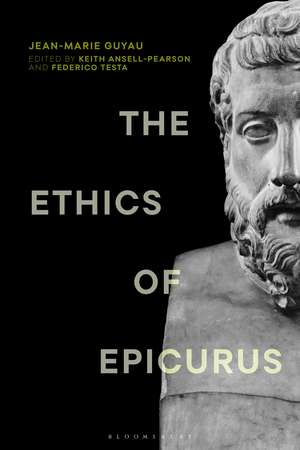The Ethics of Epicurus and its Relation to Contemporary Doctrines: Re-inventing Philosophy as a Way of Life
Autor Jean-Marie Guyau Editat de Professor Keith Ansell Pearson, Federico Testaen Limba Engleză Paperback – 17 mai 2023
| Toate formatele și edițiile | Preț | Express |
|---|---|---|
| Paperback (1) | 193.18 lei 6-8 săpt. | |
| Bloomsbury Publishing – 17 mai 2023 | 193.18 lei 6-8 săpt. | |
| Hardback (1) | 570.68 lei 6-8 săpt. | |
| Bloomsbury Publishing – 3 noi 2021 | 570.68 lei 6-8 săpt. |
Preț: 193.18 lei
Preț vechi: 250.34 lei
-23% Nou
Puncte Express: 290
Preț estimativ în valută:
36.97€ • 38.36$ • 30.90£
36.97€ • 38.36$ • 30.90£
Carte tipărită la comandă
Livrare economică 15-29 martie
Preluare comenzi: 021 569.72.76
Specificații
ISBN-13: 9781350261020
ISBN-10: 1350261025
Pagini: 304
Dimensiuni: 156 x 234 x 25 mm
Greutate: 0.43 kg
Editura: Bloomsbury Publishing
Colecția Bloomsbury Academic
Seria Re-inventing Philosophy as a Way of Life
Locul publicării:London, United Kingdom
ISBN-10: 1350261025
Pagini: 304
Dimensiuni: 156 x 234 x 25 mm
Greutate: 0.43 kg
Editura: Bloomsbury Publishing
Colecția Bloomsbury Academic
Seria Re-inventing Philosophy as a Way of Life
Locul publicării:London, United Kingdom
Caracteristici
The original translation also includes an introduction by Keith Ansell-Pearson, a conclusion discussing Epicureanism today and a bibliography of Recent Work on Guyau
Notă biografică
Jean-Marie Guyau (1854 -1888) was a French philosopher and poet. His central works include Esquisse d'une morale sans obligation ni sanction (A Sketch of Morality Independent of Obligation or Sanction) and L'Irréligion de l'avenir (The Non-Religion of the Future). His works met an enthusiastic reception by important thinkers of his time, such as Friedrich Nietzsche, Pierre Kropotkin and Henri Bergson.Federico Testa is an Associate Fellow at the Institute of Advanced Study of the University of Warwick, UK. His current research focuses on Michel Foucault's politics of life, French contemporary philosophy and the revival of Hellenistic tradition within Modern and Contemporary philosophy.Keith Ansell Pearson holds a Personal Chair in Philosophy at the University of Warwick, UK. He is the author of acclaimed monographs on Nietzsche and Bergson and has published a number of essays on Guyau's ethics.
Cuprins
Note on the TranslationEditors' Introduction: Jean-Marie Guyau on Epicurus and the Art of Living: A Novel Approach to the History of PhilosophyForeword: On the Method Used for the Exposition of SystemsIntroduction: Epicureanism in Antiquity and ModernityBook One: The Pleasures of the FleshChapter 1: Pleasure: The End of Life and the Principle of All EthicsChapter 2: Fundamental Pleasure: The StomachChapter 3: The Rule of Pleasure: Utility. - Happiness, The Sovereign Good Chapter 4: Desire. - The Ultimate End of Desire: Rest, Enjoyment of SelfBook Two: The Pleasures of the SoulChapter 1: Intellectual and Moral Serenity - Science, Opposed by Epicurus to the Idea of MiracleChapter 2: Freedom - Contingency in Nature, the Condition of Human FreedomChapter 3: Tranquillity in the Face of Death. - Epicurean Theory of Death, and its Relation to Contemporary TheoriesBook Three: Private and Public VirtuesChapter 1: Courage and Temperance. Love and Friendship. The Genesis of Friendship. The Conduct of the Sage in Human Society.Chapter 2: Justice and the Social ContractChapter 3: Progress in HumanityChapter 4: Epicurean Piety. The Struggle against Divinity understood as Efficient CauseConclusion: Epicureanism and its Analogies with Modern Positivism. The Success of Epicureanism in AntiquityBook Four: The Modern Successors of EpicurusChapter 1: The Epoch of Transition Between Ancient Epicureanism and Modern Epicureanism - Gassendi and HobbesChapter 2: La Rochefoucauld - The Psychology of EpicureanismChapter 3: Spinoza - Synthesis of Epicureanism and StoicismChapter 4: HelvétiusChapter 5: The Spirit of Epicureanism in Eighteenth-Century FranceConclusion: Contemporary EpicureanismBibliographyIndex
Recenzii
This is a fascinating study of Epicurus, also containing a valuable account of Epicureanism in the early modern period, and it is an important document in the history of Epicureanism in its own right. Guyau is himself an unjustly neglected philosopher, making this volume doubly welcome.
Once compulsory reading for Tolstoy, Nietzsche, and Bergson, Guyau's study is three books in one: a masterful introduction to Epicureanism, a modern history of the philosophy since Hobbes and Spinoza, and a passionate defense of its utility as a guide to social and ethical conduct today. This translation will reestablish Guyau's reputation as one of the great intellects - and influencers - of the late nineteenth century.
This is a beautiful translation of a game-changing classic in Epicurean scholarship. A work of philosophy in its own right, Guyau exquisitely captures the illusive nature of an ethics of the "whole of life" and reveals its uniquely emancipatory potential. Finally, English readers can discover the magic of Guyau's prose that influenced many of the greatest thinkers of 19th materialism!
Once compulsory reading for Tolstoy, Nietzsche, and Bergson, Guyau's study is three books in one: a masterful introduction to Epicureanism, a modern history of the philosophy since Hobbes and Spinoza, and a passionate defense of its utility as a guide to social and ethical conduct today. This translation will reestablish Guyau's reputation as one of the great intellects - and influencers - of the late nineteenth century.
This is a beautiful translation of a game-changing classic in Epicurean scholarship. A work of philosophy in its own right, Guyau exquisitely captures the illusive nature of an ethics of the "whole of life" and reveals its uniquely emancipatory potential. Finally, English readers can discover the magic of Guyau's prose that influenced many of the greatest thinkers of 19th materialism!






